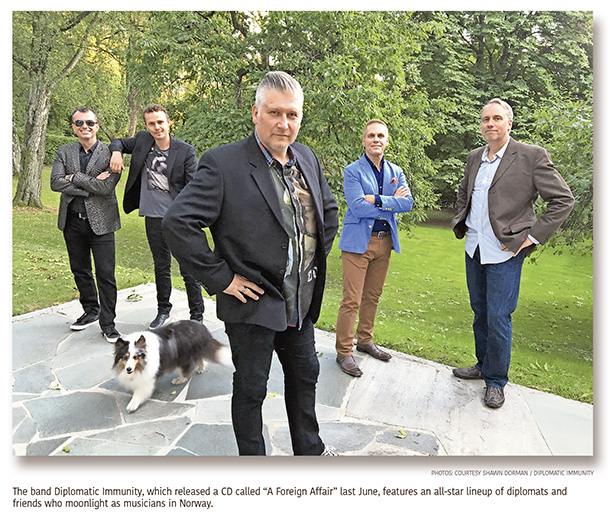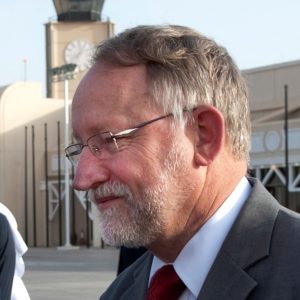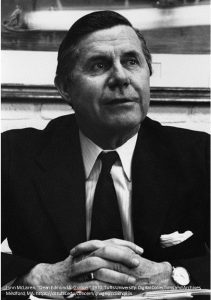Ep. 39: What comes after Putin? Assessing the future of US-Russian relations
www.defenseone.com [transcript of a Defense One radio program]; original article contains links; on Lukashenko-Putin, see also
image (not from entry) from
Excerpt:
This week we’re going to take a look at Russia and the future of the U.S.-Russian relationship, in three chapters:
After Putin (at the 1:30 mark);
Before Putin (17:14);
Now what (28:16).
It’s an investigation that will take us to a battle against the Mongols 639 years ago — ahead to Putin’s “zoo” of scary long-range weapons unveiled last year, and all the way forward to the challenges that come well after the Department of Justice’s Trump-Russia probe here in 2019.
Our guests this week include Michael Carpenter, Senior Director of the Penn Biden Center for Diplomacy and Global Engagement in Washington; Mark Galeotti, Senior Associate Fellow at the Royal United Services Institute in London; Pavel Podvig, a physicist trained at the Moscow Institute of Physics and Technology; and Tom Karako, director of the Missile Defense Pro..
International Careers Information Evening
Australian Institute of International Affairs - Victoria, Dyason House, 124 Jolimont Rd, East Melbourne VIC 3002, Australia
Excerpt:
Event fully booked. Our apologies!Interested in an international career and want to know how to get there? Looking for a career in international relations, trade or diplomacy, representing your country at the UN or working to promote Australia’s overseas interests?
Join DFAT's Victoria State Office and the United Nations Association of Victoria (UNAAV) hosted by AIIA’s Young Professionals Forum (YPF) at an event designed to give you an edge in building your professional and international career opportunities.Serving diplomats, State Government representatives and a former Ambassador to the UN will share their experiences and offer first-hand advice on how to establish your career pathways.Hear from:• DFAT representative Merinda Petersen to cover DFAT Fellowship experience, internships, pathways to UN and international careers such as DFAT and Red Cro..
U.S. Embassy in Latvia: Small Grants
lv.usembassy.gov
Image (not from entry) from
Proposals submitted by March 31 will be reviewed by mid-April, 2019.The U.S. Embassy Riga’s Small Grants Program was initiated as a flexible mechanism to enable the U.S. Embassy to support initiatives that contribute to more open and competitive political and economic systems and the protection of human rights. The Embassy adheres to U.S. Government rules and regulations pertaining to grants administration. Questions related to US Embassy Riga’s Small Grants Program may be referred to the Embassy’s Public Affairs Section at us.embassy.riga@gmail.comor +371 6710 7109.Applications must be submitted in English. Please read all the instructions below and in the application template.Program SummaryThe implementing office at the U.S. Embassy in Latvia is the Public Affairs Office (PAO), which is under the authority of the Ambassador.The Ambassador may choose whether to review and approve grant requests.Grants are aimed primarily at Latvian NGOs an..
Motley Crew of Musicians Conducts Public Diplomacy at a Very High Volume
Shawn Dorman, washdiplomat.com, March 1, 2019
On a quiet street in Oslo, the almost-famous international diplomatic band hauls their equipment out of the van to the backyard of a local couple (he’s American, she’s Norwegian) hosting a birthday bash. The sounds of rock ‘n’ roll ensue, from Norwegian classics like “Splitter Pine” to Neil Young’s “Rockin’ in the Free World” to “Sunset Moose,” an original song by the one American in the band, acting U.S. Ambassador to Norway and lead guitarist Jim DeHart. Diplomatic Immunity, which released its first (and only) CD “A Foreign Affair” last June, features an all-star lineup of diplomats and friends who moonlight as musicians: Canadian Ambassador to Norway Artur Wilczynski (drummer); U.S. Deputy Chief of Mission and Chargé d’Affaires to Norway Jim DeHart (guitarist/singer); Wilczynski’s Canadian partner, Randy Stocker (rhythm guitar/pianist); American Embassy Motor Pool Dispatcher Ørjan Tverbakk (bass player); and fitness trainer and musical t..
Publications | USC Center on Public Diplomacy
uscpublicdiplomacy.org; please refer to cited entry for original (far better) formatting
The CPD Blog is intended to stimulate dialog among scholars and practitioners from around the world in the public diplomacy sphere. The opinions represented here are the authors' own and do not necessarily reflect CPD's views. For blogger guidelines, click here.TREATING FACEBOOK AS A GEOPOLITICAL ACTORMarch 1, 2019 by Shaun Riordan
SHARE TO MOREThe British parliamentarians err by treating Facebook as just a company that needs regulating. SAY IT WITH STATUES: DISINFORMATION AND AUTHORITARIANISMFebruary 28, 2019 by Vivian S. Walker
SHARE TO MOREIn part two of this two-part series, CPD Faculty Fellow Vivian Walker positions Hungary's brick-and-mortar revisionism as classic disinformation.IN DIGITAL DIPLOMACY, HOPE TRAVELS FURTHER THAN HATEFebruary 25, 2019 by Ilan Manor
SHARE TO MOREPositive messaging of diplomacy activities negates the common belief that fear and anger travel faster o..
Public Diplomacy – Ministério das Relações Exteriores
Ministry of Foreign Affairs (Brazil), itamaraty.gov.br
image from
The concept of "public diplomacy" [JB emphasis] has been traditionally associated with the promotion of a country's image abroad. In Brazil, "public diplomacy" has been implemented not only in this traditional view, but also in the sense of greater openness of both the Ministry of Foreign Affairs and the Brazilian foreign policy to civil society, in an effort to stimulate democratization and transparency of national public policies.
The foreign ministry’s actions in different areas and the diffusion of foreign policy initiatives through digital media have intensified public diplomacy efforts in Brazil, encouraging, on the one hand, accountability to society and, on the other, interaction through comments and suggestions that contribute to the formulation of public policies attentive to national aspirations, ideas and values.
An active work of "public diplomacy" allows the Brazilian and foreign society to become inst..
An Ambassador’s View: Students from Saudi Arabia in the U.S.
Donald M. Bishop, publicdiplomacycouncil.org, February 6, 2019
Former U.S. ambassador to Saudi Arabia James B. Smith – he served in Riyadh from 2009 to 2013 — was interviewed by Checkpoints, the alumni magazine of the U.S. Air Force Academy, his alma mater. The interview was conducted long before the current debate – occasioned by the killing of journalist Jamal Khashoggi — over the future of the relationship between Saudi Arabia and the United States, but Public Diplomacy [JB emphasis] practitioners and students will find many of his comments of interest. For an updated view of how many students from Saudi Arabia are studying in the U.S., refer to the fact sheet in the Open Doors 2018 report. Here are the portions of the interview on Saudis studying in the United States.
Checkpoints: What is the average Saudi’s perception of American culture? Is there a distinction made between foreign policy and the culture itself?
U.S. Ambassador to Saudi Arabia James Smith in Riyadh, Saudi Arabia o..
Faint Glimmers of Hope in a Devastated Middle East?
Alan Heil, publicdiplomacycouncil.org, February 22, 2019
In an essay entitled “The Middle East: Regional Disorder,” Columbia University Professor Lawrence G. Potter warns of the impact on global security of catastrophic developments in that troubled region. It’s a prime reason for U.S. and international public diplomacy [JB emphasis], in all its forms.Writing in the 2019 edition of the Foreign Policy Association’s annual Great Decisions series, Professor Potter reviews grim developments in four major Middle East countries, Iran, Saudi Arabia, Turkey and Syria.Great Decisions is designed to stimulate discussion across the U.S. of citizens interested in current global issues.In a Great Decisions essay written late last year, the Columbia University scholar characterized the Middle East bluntly:“It remains a region in turmoil. A century after the map of the region was decided by colonial powers, states that never achieved coherence or legitimacy are failing.“There is a crisis in leadershi..
A Tale of Metrics: Japan’s Wartime News and Propaganda
Donald M. Bishop, publicdiplomacycouncil.org, February 26, 2019
“Metrics,” “data,” “evaluation,” and “results, not outputs” have proven to be real challenges for Public Diplomacy [JB emphasis] and strategic communication. So has demonstrating that a program, activity, or campaign “moves the needle.” Yesteryear Foreign Service Officers at U.S. Information Service posts religiously tallied “placements.” From time to time, USIA’s research office commissioned surveys. At the dawn of the social media era, counting “hits,” “page views,” followers, “likes,” and “friends” had its day. Now, “big data” seems full of promise.Once upon a time, however, the tools of measurement were a ruler, a pencil, and a notebook. Reading an account of those pioneer days may give a brief respite from current headaches. Everyone needs an occasional chuckle.In the 1970s, Foreign Service Journal ran a series of articles, “Tales of the Foreign Service,” later gathered in a book. Copies of the volume are treasured fo..
The origins of “public diplomacy” (updated 3/2/2019)
Daniel Birdsall, February 26, 2019, sites.tufts.edu/fletcheradmissions; see also
If you’ve poked around our website enough, or otherwise have more than a passing familiarity with Fletcher, you’ve likely come across the term “public diplomacy” [JB emphasis] at some point. While it mostly makes intuitive sense to me, I’ve rarely stopped to think specifically what we’re talking about when we refer to public diplomacy. An interesting piece of web content recently trickled down to me by way of one of Fletcher’s longest-tenured faculty members, as well as our Dean of Admissions, which I thought worth sharing. At the risk of becoming an irksome content regurgitator, I’d encourage readers to check out this recent post by former diplomat and current blogger John Brown. Brown highlights the work of Edmund Gullion, a former NATO SACEUR and Dean of The Fletcher School in the 60s and 70s (a general career path shared by our previous Dean, Admiral James Stavridis). Searching for a descriptor for the..


















